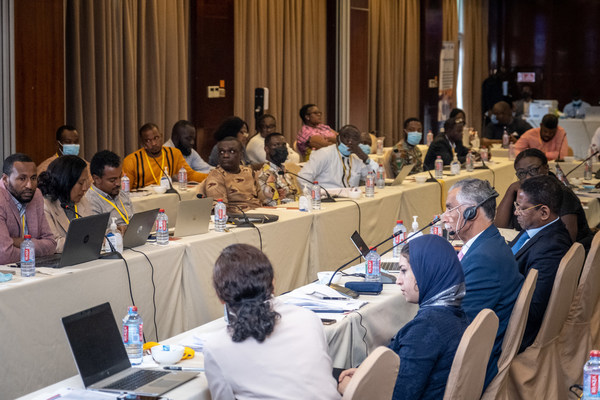The three-year project is being implemented in Ghana, Ethiopia, and Egypt to ensure the continuity and quality of learning under normal and crisis situations.
SHENZHEN, China, July 18, 2022 /PRNewswire/ -- A three-day cross-country seminar hosted in Accra, Ghana on the subject of the Technology-enabled Open Schools for All (TeOSS) project drew to a close on July 7.

A three-day cross-country seminar hosted in Accra, Ghana on the subject of the Technology-enabled Open Schools for All (TeOSS) project drew to a close on July 7. Following the official launch of the TeOSS project on 25 November 2021, the seminar was co-organized by Huawei and UNESCO as part of the project’s implementation phase. The event included a progress report on the first phase of the project, including results so far, and discussed the implementation of the second phase.
Following the official launch of the TeOSS project on 25 November 2021, the seminar was co-organized by Huawei and UNESCO as part of the project's implementation phase. The event included a progress report on the first phase of the project, including results so far, and discussed the implementation of the second phase.
UNESCO is assisting the Ministries of Education and other partners in Egypt, Ethiopia, and Ghana with the delivery of the three-year TeOSS project, which will run until August 2023. Developed under the framework of the UNESCO-Huawei Funds-in-Trust, the project spans the design, pilot testing, and scaling-up of open technology-enabled school systems. Including curricula, teacher-student interaction, and social care, these systems will be accessible in schools, homes, and other venues, ensuring education continuity and quality even if a crisis such as the pandemic occurs.
"There three axes to steer the digital revolution, which are all reflected in this project: to ensure connectivity for all; to build free, public digital learning content and platforms; and to focus on how technology can enhance pedagogical innovation and change," said Stefania Giannini, Assistant Director-General for Education, UNESCO.
Planned in close collaboration with the governments of Egypt, Ghana, and Ethiopia and aligned with their respective national strategies, each TeOSS project has been developed to meet specific local needs.
In Egypt, an ICT skills framework has been developed for teachers and students in K12 schools. Digital courseware development experts and primary and junior high school teachers will receive training, and a National Distance Learning Centre will be established for use by educators nationwide to ensure continuity in professional development.
"Since Egypt launched its new system, the President has provided unprecedented commitment to modernize the country's education model," said Dr. Hanem Ahmed, Head of International Cooperation for the Minister of Education and Technical Education of the Arab Republic of Egypt on behalf of H.E. Dr. Tarek Shawki, Minister of Education and Technical Education of the Arab Republic of Egypt.
The TeOSS project in Ethiopia is focusing on ICT infrastructure build-out to connect pilot schools, train teachers and students, and build a Learning Management System integrated with a Teacher Training Platform.
"The project perfectly aligns with Ethiopia's national strategies regarding the need to use ICT and digital content in our system. We will also scale up this system by adopting and customizing all activities according to the local context," said Dr. Zelalem Assefa, CEO of ICT and Digital Education for the Ministry of Education of the Federal Democratic Republic of Ethiopia.
In Ghana, the focus is on creating digital content for all subjects, as well as providing training for teachers and students of primary and junior high schools. The project is also building an e-repository that teachers can use to upload content and which learners can access online and offline with little or no supervision.
"We need to be able to embrace technology to enhance our education delivery. If we want to be able to achieve SDG-4, we need digital platforms as an enabler and leverage to achieve that," said John Ntim Fordjour, Deputy Minister of Education, on behalf of H.E. Dr. Yaw Osei Adutwum, Minister of Education of the Republic of Ghana.
TeOSS is aligned with the Tech4Education domain of Huawei's digital inclusion initiative TECH4ALL, which aims to drive education equity and quality with technology, and is working to enhance digital access, improve digital skills, and develop high-quality courses. Huawei ICT Academy program is designed to help cultivate ICT talent by improving digital skills.
"To achieve global education equity and share education resources, Huawei has launched the comprehensive one-stop service platform 'Huawei Talent'," said Zhang Jing, Senior Director of Huawei Education Talent Ecosystem, Huawei ICT Academy Development. "To bridge the gap between talent supply and demand in the digital era, Huawei is building talent alliances, improving skills, developing talent standards, and promoting the value of talent to help the world become more digital."
Technology is already demonstrating intrinsic value in transforming education, a value that will continue to grow in the future.
"Digital technology has become a new driver of productivity that supports innovation in education models, the transformation of education methodologies, and smarter education environments," said Kevin Zhang, CMO of ICT Infrastructure for Huawei. "We are exploring how to apply AI, such as computer vision, natural language processing, and speech processing, to education. Innovative technology can help solve the world's most pressing challenges. And we must continue working together to innovate."
The collaborative and innovative approach of the TeOSS project is helping to create inclusive, equitable, and quality education for all and underpin lifelong learning opportunities. It will empower nations to rethink education and underpin a new generation of digital schools and digital learners.